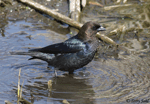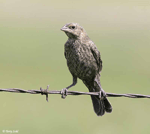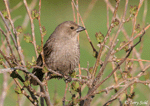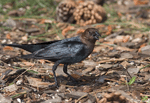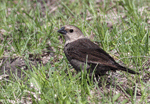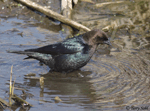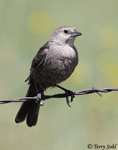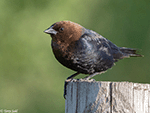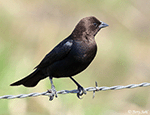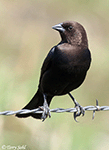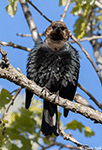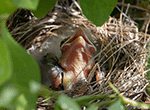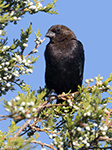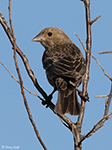Brown-headed Cowbird
Molothrus ater
| Length: 7.75 inches | Wingspan: 13 inches | Seasonality: Summer |
| ID Keys: Black body with brown head (male) | ||
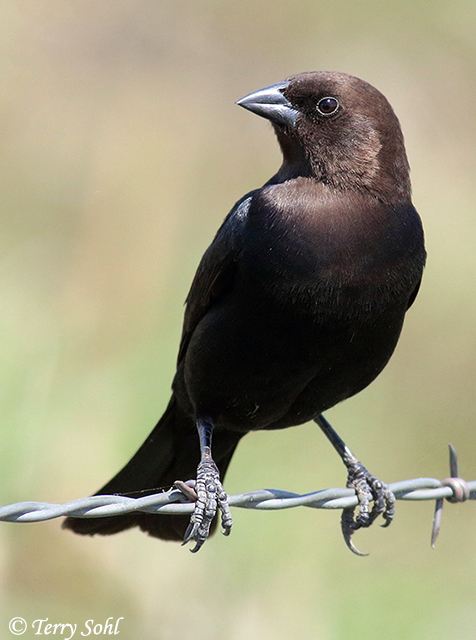 The
Brown-headed Cowbird was originally a bird of the Great Plains, following herds
of bison and feeding on the insects that were stirred up. It has
undoubtedly benefited greatly from man's alteration of the landscape and
introduction of grazing cattle in all parts of the country. Cowbirds'
claim to fame, however, is its characteristic brood parasitism. As with
all cowbirds, it lays its eggs in the nests of other species, leaving the host
species to raise its young. Over 150 different species have been known to
unwittingly raise the young of Brown-headed Cowbirds. One endangered
species, Kirtland's Warbler, is
partially managed by active removal of cowbird eggs and removal of cowbirds
themselves from warbler nesting areas.
The
Brown-headed Cowbird was originally a bird of the Great Plains, following herds
of bison and feeding on the insects that were stirred up. It has
undoubtedly benefited greatly from man's alteration of the landscape and
introduction of grazing cattle in all parts of the country. Cowbirds'
claim to fame, however, is its characteristic brood parasitism. As with
all cowbirds, it lays its eggs in the nests of other species, leaving the host
species to raise its young. Over 150 different species have been known to
unwittingly raise the young of Brown-headed Cowbirds. One endangered
species, Kirtland's Warbler, is
partially managed by active removal of cowbird eggs and removal of cowbirds
themselves from warbler nesting areas.
Habitat:
Prefers open to semi-open habitats, including woodland edges, riparian areas, farms, prairies, and residential areas.
Diet:
Seeds and insects.
Behavior:
Primarily forages by walking along the ground. They also often associate with cattle, horses, or wild bison, following the large animals and picking off insects stirred up. They will also sometimes perch on the backs of these large mammals, and it is thought they may pick ticks and insects off of the animals' backs.
Nesting:
May through August. No nesting occurs, Brown-headed Cowbirds lay eggs in the nests of other bird species. One female can be a very prolific egg-layer, laying one egg per day in the nest of another bird for up to a month or more. Species' nests in which they deposit eggs are many and varied, from marsh-dwelling birds to birds of the forest. Over 150 different species have been documented as having nests parasitized by Brown-headed Cowbird eggs.
Song:
The song is a short series of low bubbly notes followed by thin whistling. Brown-headed Cowbirds also have a number of call vocalizations, including thin whistling, chattering, and clucking notes.
- Click here to hear the song of a male Brown-headed Cowbird1
- Click here to hear the rolling chatters of a Brown-headed Cowbird2
- Click here to hear thin whistled calls of a Brown-headed Cowbird3
Migration:
Populations throughout most of the Northern U.S. and higher elevations of the West move southward in the fall. In the eastern US and the South, Brown-headed Cowbirds can be found year-round.
Interactive eBird Map:
Click to access an interactive eBird map of Brown-headed Cowbird sightings
Similar Species:
In South Dakota, adult males are distinctive, with an obvious brown head that differentiates them from other blackbird species Species that could possibly be confused with Brown-headed Cowbirds in certain situations include the following:
- Brewer's Blackbird - In the western part of the state, Brewer's Blackbirds could potentially be confused with Brown-headed Cowbirds if not seen well. Male Brewer's Blackbirds are black overall like a Brown-headed Cowbird, but lack the obvious brown head however, and have a yellowish eye that contrasts with the rest of the bird's plumage, compared to the dark eye of a Brown-headed Cowbird. Females are the most likely to be confused. Female Brewer's Blackbirds, however, have a bill that's thinner and longer, compared to the robust, shorter bill of a Brown-headed Cowbird.
- Common Grackle - Another very common blackbird species in much of South Dakota, Common Grackles are easily differentiated from Brown-headed Cowbirds, as they're larger, lack the brown head (males), have a notably longer bill, and have a much longer tail.
- Shiny Cowbird - Not an identification challenge in the US, but it can be in the limited US range of the Shiny Cowbird (primarily coastal Florida). Male Shiny Cowbirds are much more consistently black, lacking the brown head of a Brown-headed Cowbird. Female Shiny Cowbirds have a more "clean" looking breast and underside than a female Brown-headed Cowbird, who appear to have some subtle streaking or mottling.
- Bronzed Cowbird - Another Cowbird species that's not an identification problem in South Dakota, but overlaps in range with Brown-headed Cowbirds in parts of the far southern US. Male Bronzed Cowbirds appear to be more uniformly dark, lacking the contrasting brown head of a Brown-headed Cowbird. They also appear more "stout", with the neck of a bulldog (best description I can arrive at!). The red eye is obvious on a Bronzed Cowbird in both males and females (compared to a Brown-headed Cowbirds dark eye).
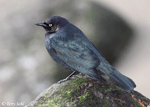 |
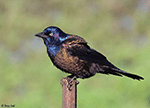 |
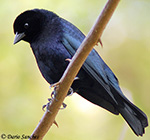 |
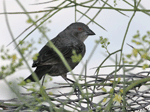 |
| Brewer's Blackbird | Common Grackle | Shiny Cowbird | Bronzed Cowbird |
Conservation Status:
Brown-headed Cowbirds are likely much more widespread and abundant than before man's alteration of the landscape and introduction of grazing cattle. The cutting of forests, creation of new open spaces, and proliferation of "edge habitat" loved by cowbirds has resulted in population increases and access to many nesting bird species that were previously relatively unaffected by Brown-headed Cowbirds. Populations have shown some slight declines in recent decades, but Brown-headed Cowbirds are still very common in parts of what's an extremely broad geographic range. The IUCN lists the Brown-headed Cowbird as a species of "Least Concern".
South Dakota "Hotspot":
No hotspot necessary to report, as Brown-headed Cowbirds are extremely common across most of the state. They can be found in urban and suburban settings as well as agricultural land and more natural habitat. Large flocks are indeed often found in conjunction with cattle.
Bird Feeders:
Will attend feeders for various seeds and grains
Further Information:
Photo Information:
July 7th, 2008 - Pactola Reservoir, Black Hills of South Dakota - Terry Sohl
Additional Photos:
Click on the image chips or text links below for additional, higher-resolution Brown-headed Cowbird photos.
Audio File Credits:
- 1Russ Wigh. Recorded in Chatham County, Georgia on May 31st, 2020. Original recording and information from xeno-canto.
- 2Russ Wigh. Recorded in Chatham County, Georgia on June 17th, 2020. Original recording and information from xeno-canto.
- 3Jonathon Jongsma. Recorded in Hennepin County, Minnesota on April 19th, 2016. Original recording and information from xeno-canto.
| Click on the map below for a higher-resolution view |
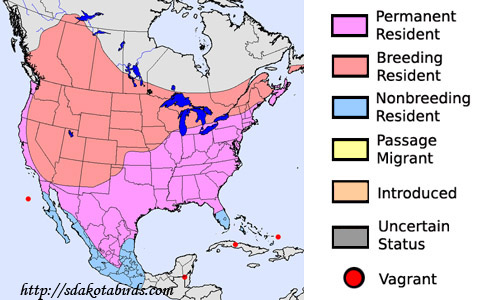 |
| South Dakota Status: Common summer breeding resident throughout the state |
Additional Brown-headed Cowbird Photos
Click for a higher-resolution version of these photos
